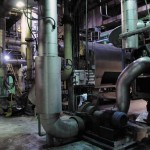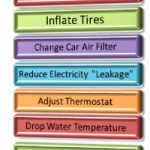Energy
2525 West End earns EPA’s ENERGY STAR for energy efficiency
Jun. 8, 2010—The 2525 West End office building has earned the U.S. Environmental Protection Agency’s ENERGY STAR® for the eighth consecutive year, indicating that the building performs in the top 25 percent of similar facilities nationwide for energy efficiency. The facility scored 90 out of 100 possible points. The 2525 West End building is owned by The...
VU neighborhood aiming for 5 percent energy reduction
Nov. 2, 2009—Go Green, District 18 is an initiative to reduce District 18’s energy consumption by 5 percent. Because Vanderbilt is located in District 18 and many faculty and staff members live there, the university is encouraging people to participate. Homeowners and businesses in District 18 are encouraged to sign up for an NES In-Home Energy Evaluation...
What can you do to affect climate change? Small changes at home make a big difference
Oct. 26, 2009—[Originally published in MyVU] While longer-term options are being developed, individual households can reduce overall carbon emissions by implementing a series of small changes, such as lowering the temperature on water heaters and regularly performing maintenance on cars and air-conditioners, according to an article published today. Jonathan Gilligan, associate professor of Earth and Environmental Sciences,...
Another look at the coal plant
Feb. 1, 2009—[Originally published by Vanderbilt Student Communications in InsideVandy] By Simon Hirsch President Barack Obama’s inauguration last month and a December coal spill in Kingston, Tenn. both may lead to an increased focus on campus coal safety. Obama’s energy plan aims to simultaneously provide short-term relief to American families, eliminate current imports from the Middle East...
Seven easy actions you can do today to save the environment and gas
Oct. 20, 2008—[Originally published by Vanderbilt News Service in MyVU] Want to save gasoline, lower your power bills and help save the environment? New Vanderbilt research identifies seven simple actions individuals can start today that have the potential to dramatically reduce energy use and carbon emissions. Individuals generate up to 40 percent of U.S. greenhouse gas emissions....
Vanderbilt under energy curtailment
Jul. 24, 2008—[Originally published by Vanderbilt News Service in MyVU] Because of the soaring temperatures and the accompanying demand placed on energy resources, the Tennessee Valley Authority has issued an energy curtailment beginning July 24 and lasting at least 15 days. During this period, members of the Vanderbilt community are being asked to reduce their energy consumption....
Going Green
Apr. 1, 2008—[Originally published by Vanderbilt News Service in The Vanderbilt View] Some of Vanderbilt’s initiatives to reduce energy usage and help make the university more Earth-friendly include: Lightbulbs: Projects like a recent lighting retrofit at Kirkland Hall are saving energy. Replacing old-style incandescent bulbs with more energy efficient lighting has reduced electricity consumption in the building...
Black + Gold = Green
Apr. 1, 2008—[Originally published by Vanderbilt News Service in The Vanderbilt View] When it comes to sustainability, Vanderbilt is rewriting the equation. By David Green Photography by Steve Green and John Russell When Andrea George took the helm of the newly created Sustainability and Environmental Management Office, she had no idea she’d spend so much time talking...
Podcast: GreenVU Informational Panel Discussion
Jan. 28, 2008—[Originally published by Vanderbilt News Service] The GreenVU organization arranged a Jan. 24 panel presentation to discuss sustainability projects at Vanderbilt University. Listen to podcasts of the presenters: Andrea George, PhD, Director, Sustainability and Environmental Management Office Jack Barkenbus, Research Fellow, Vanderbilt Center for Environmental Management Studies Jennifer Hackett, Vanderbilt University Recycling Coordinator Keith Loiseau,...
Green effort at Vanderbilt extends into virtual world
Jan. 2, 2008—[Originally published in MyVU] The computing revolution comes with a not-often acknowledged environmental cost. Computers – and the servers which allow them to run – use energy and give off heat. Then they have to be cooled down, using more energy. At Vanderbilt, officials with Information Technology Services are using a “server virtualization” strategy to...








